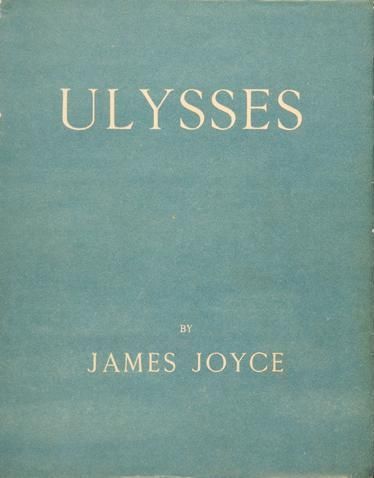
As
a child, I was a Bennett Cerf fan because of the funny books he wrote.
As an adult, I became vaguely aware that he was the publisher who
founded Random House. But Cerf will be known to history as a man who
battled for your right to read. In 1920, the James Joyce novel
Ulysses
was judged obscene and banned in the U.S. In 1932, Cerf was determined
to reverse that decision, and crafted a scenario that would lead to a
court ruling on the book. But first, a crime had to be committed, so it
was arranged for a smuggled copy to be intercepted at an American port
of entry. Things did not go quite as planned.
The
smuggler was following very specific instructions. He’d obtained the
text, just like he’d been told. He stuffed the book into his suitcase.
Then he boarded the luxurious Aquitania in Europe, with orders to
disembark at this very port. But as he waited in line eying the customs
officials, things weren’t going to plan. In fact, it looked like the
officer was just going to wave him through. This was not what the
smuggler was being paid to do; he was under strict orders to get caught!
“Get out; get on out,” the customs agent yelled. Instead of
checking bags for contraband, the officers were frantically stamping the
suitcases in front of them. They didn’t bother to look inside, or halt
passengers for random checks. As the official tried to push the smuggler
forward, the traveler did something inane: he demanded to be inspected.
"I insist that you open the bag and search it."
"It's
too hot," argued the inspector. Indeed, the temperature in the room was
well over 100 degrees. The officials were rushing people through so
they too could call it a day. But the passenger insisted. “I think
there’s something in there that’s contraband, and I insist that it be
searched.”
Despite such setbacks, the court case was established, and
the story of how Cerf worked behind the scenes to bring the book’s censorship to an end can be found at mental_floss.
 As
a child, I was a Bennett Cerf fan because of the funny books he wrote.
As an adult, I became vaguely aware that he was the publisher who
founded Random House. But Cerf will be known to history as a man who
battled for your right to read. In 1920, the James Joyce novel Ulysses
was judged obscene and banned in the U.S. In 1932, Cerf was determined
to reverse that decision, and crafted a scenario that would lead to a
court ruling on the book. But first, a crime had to be committed, so it
was arranged for a smuggled copy to be intercepted at an American port
of entry. Things did not go quite as planned.
As
a child, I was a Bennett Cerf fan because of the funny books he wrote.
As an adult, I became vaguely aware that he was the publisher who
founded Random House. But Cerf will be known to history as a man who
battled for your right to read. In 1920, the James Joyce novel Ulysses
was judged obscene and banned in the U.S. In 1932, Cerf was determined
to reverse that decision, and crafted a scenario that would lead to a
court ruling on the book. But first, a crime had to be committed, so it
was arranged for a smuggled copy to be intercepted at an American port
of entry. Things did not go quite as planned.
No comments:
Post a Comment